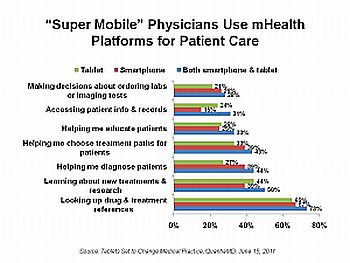Physicians who have adopted smartphones and tablet devices access online resources for health more than less mobile physicians. Furthermore, these “Super Mobile” doctors are using mobile platforms at the point of care.
Physicians adoption and use of mobile platforms in health will continue to grow, according to a survey from Quantia Communications, an online physician community. This poll was taken among 3,798 physician members of QuantiaMD’s community in May 2011. Thus, the sample is taken from the community’s 125,000 physicians who are already digitally-savvy doctors. QuantiaMD calls physicians with both mobile and tablet devices “Super Mobile” physicians.
The most common mobile devices among the Super Mobile doctors in QuantiaMD are iPhones, used by 59%; iPads, used by 29%; and, Android smartphones, used by 20% of the physicians surveyed. Blackberry devices are used by 14% of the doctors in the poll.
Just under one-half of these doctors plan to purchase a mobile device in 2011, notably an iPhone, an iPad, or an Android.
Among all physicians, 19% already use a tablet device in practice, and 35% say they’re “extremely likely” to do so. Another 29% say they’re “somewhat likely” to use a tablet in clinical practice.
The chart shows various professional activities that Super Mobile physicians do using mobile devices. Among the activities Super Mobile physicians use mobile devices for are looking up drug and treatment reference materials and learning about new treatments and research. Nearly 1 in two doctors who use both smartphones and tablets use the devices to help with diagnoses and choosing treatment paths for patients.
Physicians told QuantiaMD that accessing EHR data via mobile devices is a top priority.
It’s important to know that there doesn’t seem to be a mobile-divide among Super Mobile physicians based on age or practice setting. Currently, 20% of doctors practicing 10 years or less use a tablet in practice; 19% of doctors practicing 31 years or longer use a tablet.41% of doctors practicing 31 or more years say they’re likely to use a tablet in practice versus 58% of doctors practicing 10 or fewer years.
Jane’s Hot Points: The phenomenon of the Super Mobile doctor who, armed with mobile platforms, engages more in online health apps via mobile is similar to a trend Susannah Fox of the Pew Internet & American Life Project spotted in her survey on consumers’ use of online health resources: that when a person has access to broadband, their health searches are more engaging in terms of time spent seeking health information.
In the case of the Super Mobile physician, adoption and use of mobile platforms deepens their relationship with the online health world. They’re using smartphones and tablets in their workflow in two ways:
- When face-to-face with patients for education and to access patient data via EHRs and other databases; and,
- Research into diagnoses, therapeutic options, and clinical research.
This first aspect of patient-facing use of mobile technologies is an exciting development: physicians using mobile devices can bolster patient health engagement, which when coupled with accessing EHR data can move the doctor toward meaningful use of HIT. Engaging in patient education at the point-of-diagnosis and -care can further the patient’s health literacy and self-efficacy in care once she leaves the exam room.
Lest we get carried away in interpreting the results, let’s remember that this poll was conducted among Super Mobile doctors who represent the vanguard of the new-new digital clinician. There are barriers that will impede other physicians from pursuing patient activities using a mobile device which were, smartly, explored in the survey. Top of the list of barriers are concerns about patient privacy, noted by 54% of the doctors in the survey, followed by concerns about liability (46%), concerns that patients don’t have the technology (37%), and ability to be paid for the use of mobile activities in practice (36%).
Jane Sarasohn-Kahn is a health economist and management consultant that serves clients at the intersection of health and technology. Jane’s lens on health is best-defined by the World Health Organization: health is a state of complete physical, mental and social well-being and not merely the absence of disease or infirmity. She blogs at HEALTHPopuli.
Categories: Uncategorized










